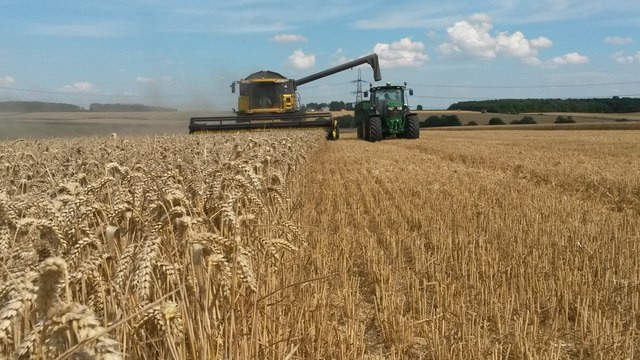Disease challenges and poor weather are continuing to cause issues for UK cereal farmers, who are seeing lower yields of wheat, winter barley and oil seed rape. Analysis by the Agriculture and Horticulture Development Board, based on farmer reports, has however found that recent warmer, dry weather means that crops in many regions have been harvested at moistures meaning little has required drying.
Winter Barley Yields
Harvesting of winter barley is all but complete with the average reported winter barley yield just 6.3t/ha – down 11% on the 5-year average. There is a significant deviation in yields between regions. Yields in the Easter region were 22% higher than average, but were down in all other regions except the South East, where the 5-year average level was seen. The largest decline in winter barley yield was found in the East Midlands, with yields 21% below average.
Quality has generally been satisfactory, although there have been some issues with lower bushel weights and subsequently lower screenings, as well as some comments regarding increased admix, primarily volunteer cereals or secondary growth.
Oilseed Rape Yields
This summer’s harvest is almost complete but yields are again down for all areas except for the Eastern region. However, eastern farms surveyed have generally lower average yields due to historic cabbage stem flea beetle challenges. Yield declines this season are not entirely due to pest pressure, with clubroot also posing problems.
Yields are down 9% overall across the UK, at an average of 2.93t/ha. The greatest decline in yields was reported in Yorkshire and the Humber, down 29% on the 5-year average, but declines of more than 20% were also seen in the West Midlands and South West. Yields were slightly better on lighter ground.
Oil content was reported to be at 45%, with very few samples below 44%. Specialist WOSR crops such as High Oleic and Low Linolenic and High Erucic Acid Rape varieties have reportedly produced oil contents of greater than 47%.
Wheat Harvest: Progress and Challenges
More than a third of the UK’s wheat harvest has now been completed (37%) with greatest progress in the East Midlands (65%) and South East (48%). This year progress reflects the total wheat area, including spring wheat as the extreme weather meant some winter varieties were planted later than usual. There was also a greater spring wheat area than usual.
While progress still looks to be ahead of both last year and the 5-year average, yields of just 7.5t/ha are down 7% on the 5-year average with lower yields reported in all areas, except the Eastern region, where the 5-year average was met.
About a fifth of the national crop has been harvested (14 August) with winter oat yields also reported as being disappointing – down 6%. Quality has been good with most samples meeting milling specification. The AHDB said grass weed pressures had bene high, seen through an increased prevalence of ergot in some samples. Ergot has mainly been seen as coming from grass weeds rather than cereal crops. There are generally high levels of grass weeds and volunteer cereals within crops, including blackgrass, ryegrass and brome.
Wheat Quality and Straw Availability
Yields, protein levels, and straw supplies all remain in doubt for this year’s harvest, with the latest industry estimates forecasting winter wheat down at 7.5t/ha. Roughly half the GB winter wheat area was cut by mid-August. Some analysts have forecasted that yields could drop further as harvest progresses.
Quality has been the major concern for flour millers. Protein levels for Group 1 wheats are coming in low at about 12%. A reduced availability of top specification milling wheat, combined with a smaller harvest area, could help it to hold a reasonable premium over feed wheat in the coming months.
Ex-farm prices collected by Farmers Weekly on 21 August put milling wheat at £233/t, a £59/t premium above feed wheat. Merchants at Sussex-based grain traders Bartholomew’s said milling wheats of all grades will be the most active markets in coming weeks. This is due to mills opening up to a new crop supply and starting to actively create their blends.
The Impact on Grain Markets
UK millers are likely to need to import milling wheat from the EU to fill requirements. However, the EU-27 soft wheat crop has been revised down by Strategie Grains to 116.5m tonnes. This is more than 10m tonnes below 2023 volumes, which should support domestic prices.
Meanwhile, UK feed wheat futures for the November contract fell to its lowest point since March on 16 August before lifting to £184.55/t by midweek. Traders at Dewing Grain said for what little demand there is, supply is hard to find. Disappointing UK wheat yields and low prices are making growers very reluctant to sell unless finance is required.
Straw Supply and Prices
Buyers are generally keen to get their hands on straw. There is little stock held over from last year following the wet winter. And fewer bales are likely to be available this year due to the smaller harvest area. However, higher straw prices may encourage some farmers to bale rather than chop straw, which could help to increase supplies.
As harvest progresses, farmers have reported variable straw yields in different regions of the UK. There is an abundance of straw in parts of the east of England, but lower volumes elsewhere. The latest harvest report by Andersons and AHDB suggested winter wheat straw yields had been highly variable. There had also been smaller swaths for winter barley, compounding challenges with availability this season.
Straw merchants say there are large regional differences in prices at the moment. Ex-farm prices for big square-baled wheat straw this week ranged from £50/t in south-east England to £80/t in parts of Scotland, according to the British Hay and Straw Merchants’ Association. This is compared with a range of £40-£65/t in the same week last year.
Frontier Acquires Fengrain
The assets of grain co-operative Fengrain, including its 93,000t crop storage site in Cambridgeshire, have been acquired by the UK’s largest crop marketing business, Frontier, for an undisclosed sum. Fengrain and Frontier first partnered in 2019, with Frontier taking over its grain trading and marketing services. Simon Christensen, Frontier’s grain director, said: “The acquisition of Fengrain is positive news and means we’re able to provide growers with more financial security and grain handling expertise across the east of England.”
Fengrain chairman Richard Means believes the deal has delivered the right result for its members and the future of the store.

















